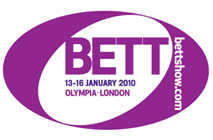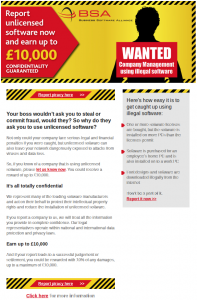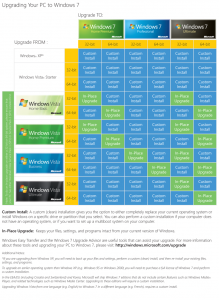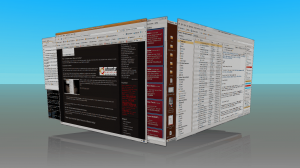BSA Supporting Free & Open Source Software
Recently I’ve been getting, what I initially and mistakenly assumed to be, spam in my inbox from the Business Software Alliance. An organisation that doesn’t immediately spring to mind when thinking about Freedom and choice in software.This spam marketing literature however, is actually a very compelling call to action for those businesses that aren’t already protecting themselves by using Free and Open Source Software. If the image isn’t terribly legible, here are a few of the juicy bits just SCREAMING at you to think very carefully about the software choices you make in your business.
Your boss wouldn’t ask you to steal or commit fraud, would they? So why do they ask you to use unlicensed software?
Note the phrasing: “unlicensed software”. Of course Free software is licensed, so that’s OK then. There are lots of great Free Software licenses.
Here’s the bit where the BSA really start to suggest you should be using Free Software.
Here’s how easy it is to get caught up using illegal software:
- One or more software licenses are bought, but the software is installed on more PCs than the licenses permit
- Software is purchased for an employee’s home PC and is also installed on to a work PC
These activities are perfectly OK and in-fact encouraged with licensed Free software. A Free Software License gives a user the freedom to do these things; It’s called freedom 2: The freedom to redistribute copies so you can help your neighbor.
- Font designs and software are downloaded illegally from the internet
You can download legally lots of font designs from places such as the Open Font Library and Google’s WebFont Library online.
The recently released Ubuntu font is an excellent example of a high quality, freely available font.. You can read about it here, get it from here and even get the font source from here. You may also choose to use the Google Font API to use it freely on your website from here.
And as for downloading “software” well, there’s probably more Free software available for download than the BSA could shake a stick at.
So please, consider carefully what our friends at the BSA have to say and talk your bosses or employees about the choices they make. Using properly licensed software is not hard. You don’t have to be at risk from even making a simple mistake. Using licensed Free software protects you.
If you are in a business and want advice on the choices available there are companies such as our own that can help. The BSA would rather your employees take you to the cleaners…
So, if you know of a company that is using unlicensed software, please let us know now. You could receive a reward of up to £10,000.
Maverick Meerkat Release Parties in the UK
This weekend the date on Sunday will be 10/10/10 and this being a rather special number it has been declared a global day of doing for reducing carbon outputs and participating in environmentally worthy projects as well as a good day to get married as 101010 in binary is 42 in decimal it has also been declared fourty two day in celebration of the Hitchhiker books of Douglas Adams. We will be doing something much more important however as it is the release day of Ubuntu 10.10 the Maverick Meerkat. In the UK there will be a release party on Sunday, which is also a 42 day celebration including screening of the HHGTTG film. The event will continue into the evening and I am sure a good time will be had by all those who don’t come dressed as Marvin the paranoid android.
A somewhat more civilized and sensible event follows on Tuesday 12th at Fossbox in London, mainly aimed at charities and the voluntary sector, introducing attendees to the Ubuntu desktop.
On Wednesday 13th there is another event, this one hosted by University College London and aimed mostly at students, but open to all.
On Saturday 16th in Swindon there will be demos and info about Ubuntu at the Museum of Computing, again this event is open to all.
If you are in the area of any of these events then do pop along, either if you haven’t used Ubuntu before and want to find out more, or if you are a seasoned veteran and want to meet other people in your area and talk about Ubuntu.
If you are wondering why there is a bit of a London focus to the events (apart from the Swindon one of course) and you want an event in a city near you then don’t forget *you* can organise events, and ask for help in the ubuntu-uk mailing list to gather support for an event where you want it.
Westminster eForum Speech
Today I had the pleasure of addressing the Westminster eForum event on Free and open source software in business, in government. I had a five minute slot following the excellent Karsten Gerloff of the Free Software Foundation Europe, then after speeches from Paul Holt, Andrew Katz and Christopher Roberts we had a panel Q&A with questions from the audience. Here are the notes from my speech, transcripts of the whole event will be distributed around Westminster. The seminar was sponsored by our friends at Sirius.
Hello & Good Morning Ladies & Gentleman.
My name is Alan Lord and I am co-owner of The Open Learning Centre; an Open Source Software Consulting and Services business based in Surrey.
In the few minutes I have I would like to briefly discuss a few of the themes that were suggested for this session.
So, starting with the first one then:
The challenges faced by small, medium and large organisations implementing Free & Open Source Software?
For me, one of the key challenges is Procurement:
Procurement practices have not kept pace with changing times. Existing policies and procedures often struggle with the idea of acquiring something that is â€freeâ€. In addition, in our Free Software marketplace, many suppliers do not have the budgets or resources to participate in lengthy tendering processes and, frankly, often have better and less costly opportunities to pursue elsewhere.
Another challenge is lack of familiarity and knowledge: There is still a significant proportion of the population who haven’t really heard of, or understand what Free & Open Source Software is, even though they may use it everyday. The Open Source community has made tremendous inroads and awareness is definitely increasing, but bear in mind, we are competing against companies with multi-billion dollar marketing budgets.
Now I’d like to move on to mention something about:The costs of deploying Free and Open Source software?
Firstly, it’s important to recognise that the â€free†in Free Software generally refers to freedom and not necessarily the price; although Open Source Software is frequently zero cost too. It should be recognised that implementing any software solution has costs, whether or not the software itself is freely available.
Time, of course, is not free; training, consulting and other professional services require people and knowledge, all of which have a cost whether they be internally or externally sourced. Although I feel fairly confident in saying that Open Source providers tend to charge comparatively less, I would recommend you use your experience to estimate and budget for the financial costs of the professional services you will need to acquire. Typically, the work required will be similar, in volume at least, for any given project whether Free or proprietary.
The financial benefits of Open Source really make an impact once you start using it: There are no ongoing licensing fees; you may copy and replicate what you have as many times as you wish. Product development, bug fixes and new features can generally be introduced at your discretion, and not that of your software vendor.
Another question that is often discussed is:
Is Open Source Software vulnerable?
Open Source Software is widely regarded as being inherently more secure than comparable proprietary software. Generally I would concur with this; particularly with regard to Operating Systems such as Linux and BSD. However, no software is ever infallible or 100% secure, so as an IT manager one must take all available precautions.
Many of the stories of Open Source vulnerabilities are, in the end, down to lack of skill or knowledge in setting up and maintaining these systems; this is just the same as with the proprietary alternatives. Again, skills and good education are the key to minimising these risks.
Free and Open Source Software is created in a very different way to legacy software. The ‘source code’, or instructions, are public; anyone can look at them. In a well managed Open Source project this visibility actually helps to improve the security of the end product. The benefit of this code-transparency was famously described by Eric S. Raymond, a well known Open Source author and advocate:
“Given enough eyeballs, all bugs are shallow.â€
And finally I’d like to touch upon the question:
Who is responsible if Open Source Software is compromised or malfunctions?
Well – to be blunt. You are.
But then how is this different to proprietary solutions? If you’ve ever read a License Agreement for proprietary software then I’m sure you will have noticed that they start by disclaiming all liabilities, warranties and risks. Here’s one sentence taken from a very famous proprietary software vendor’s license agreement:
“The entire risk arising out of use or performance of the OS Components AND ANY SUPPORT SERVICES remains with you.â€
If your chosen proprietary software is compromised or malfunctions what happens? Basically, you await the benevolence of the manufacturer, who is hopefully still in business and has a copy of the version of your product. With Free and Open Source Software, you will ALWAYS have a copy of the source code available.
A key feature of Open Source licensing, and something that is specifically NOT offered in the proprietary world, is the empowerment to improve and change it yourself. This doesn’t mean that you have to write the code though, there are lots of developers who will do that for a fair price.
Thank you.
BETT 2010 Review
 It’s that time of year when around 30,000 educationalists from all over the world descend on Olympia in London for the annual edu-geek-out that is BETT.
It’s that time of year when around 30,000 educationalists from all over the world descend on Olympia in London for the annual edu-geek-out that is BETT.
I’ve been going to BETT now for 3 or 4 years as an exhibitor or just helping to promote Open Source and Free Software with other like minded members of our amazing community.
This year we helped our friends and colleagues at Open Source Schools and Open Forum Europe on the Open Source Café. The simple objective of the show was to inform the education sector about Open Source and where to find help, advice and common ground with peers who’ve “been there” and “done that” already.
This year was, frankly, quite exceptional.
The stand received financial sponsorship from Red Hat, Linux IT, University of London Computing Centre and The Learning
Machine (Ingots) for which everyone is very grateful. Canonical, the commercial entity behind Ubuntu very kindly provided us with 600 Ubuntu 9.10 CDs (500 Desktop and 100 Server) to give away (thanks Larry) and there were a similar number of CDs containing a great collection of Education-centric Open Source desktop applications for Windows from Free Software for Students that was compiled and produced by Peter Kemp and David Wilmut. That’s around 1200 CDs in total full of completely Free goodness and fun. We encouraged all the recipients to copy, share and pass them on too! At the end of the show we had only a few (quite literally) of each remaining.
An interesting sum was carried out: The value of equivalent proprietary software was estimated to be over £4000 for the pair of CDs – I actually think that is rather low considering the volume of stuff in the Ubuntu repos including several real Enterprise grade applications such as OpenERP and Alfresco – so we have potentially delivered a net saving to the education sector of at least £2.5m. And of course this does not include all the free copies that will be made and passed around!
I noticed a real sea-change between this show and last year’s. I don’t actually recall speaking to one school or Local Authority this show that had no-idea of, or that wasn’t aware that they were using, Open Source Software. Most were really proud of their achievements, many were rolling out or had completed roll outs of OpenOffice.org rather than waste many thousands of pounds on unnecessary & proprietary Office Application Suite Licenses. Many more used and raved about Audacity – the ubiquitous audio capture and editing tool. No one I spoke with was reticent toward Open Source and many were keen to talk and share their experiences. This is what the Open Source Schools project is all about: using the principles of FOSS; of community, collaboration and sharing, and providing a location for this to happen. If you are involved in education and have any interest in Open Source, or even better are an expert, get involved and share your experience and knowledge gained.We also found time to meet up with friends and colleagues from Sirius, Mark Taylor and John Spencer. Sirius has been very successful in the education sector, they are the only Open Source vendor to be on Becta’s “approved supplier list”, and were nominated for an award this year for the work they and North West Learning Grid put in to the National Digital Resource Bank.
The national digital resource bank will deliver a vast range of publicly funded resources under a creative commons licence and populate your learning platforms, preparing them for effective use.
It will also create a sharing community of educators who will identify, review and improve a common set of national digital assets.
The world is really changing very fast. I go to parties and find people in all walks of life (i.e. not IT professionals) who are aware of Open Source, Governments are (some faster than others admittedly) waking up to the reality that FOSS provides significant benefits over proprietary software in many ways more than just money, and Enterprises are adopting not just Open Source Software but the principles behind it too to make their own businesses better.
BETT 2010 confirmed this trend in spades. Roll on BETT 2011.
Miles from Open Source Schools and one of the organisers of the event has also posted a review of the show that you can read here.
Building an Engaged Community
I am very pleased to report that I have an assignment for OSSWatch, an organisation set up by JISC and attached in a kind of complicated way to the University of Oxford, to report on an upcoming event Building an Engaged Community. I will be covering it in two ways, an article after the event summarising it and also a live stream throughout the day. The live blog will be hosted on coveritlive.com which is really well designed for such events. The only issue I had with it was that to be the presenter you have to be on a recent Firefox or Chrome browser (I think Opera and something else may have been in the list too) and I wanted to use it on my OLPC XO laptop that I have running Debian and the Iceweasel browser. Iceweasel is simply Firefox with a different name but the browser detection failed. Luckily the workaround was easy enough, going to about:config you can change the general.useragent.extra.firefox string from Iceweasel to Firefox, leaving the version number alone. With this done Coveritlive seems to work perfectly.
So if you want to follow along on Monday you should be able to watch the stream live in this blog post, if you have comments during the event you can submit them and I will endeavour to ask the speaker your questions. You can also tweet comments with the hashtag #opendev09 (sorry don’t think there is identi.ca integration but if your identi.ca feeds your twitter it should all work)
Our Windows 7 Special Offer
This post is a “reprint” of an email we have just sent to the subscriber list for our Liberation newsletter. The audience is largely UK based businesses and public sector organisations. Should you wish to receive Liberation, you can subscribe here and please feel free to pass it on.
Today, Microsoft invite you to part with your hard-earned cash and upgrade your computers to Windows 7®. If you are one of the majority still using Windows XP, then moving to Windows 7 may not be a pleasant or inexpensive task…
Surprisingly there isn’t actually a way to upgrade your computer from Windows XP to Windows 7 in the traditional sense. You’ll need to back up all your data, re-format the hard-drive and start again from scratch.
Windows doesn’t store your documents, personal information, historical data, emails, passwords, cookies, preferences, settings etc. in one place. So backing up and rebuilding Windows computers is a very time-consuming and complicated process:
- Work our how many licenses you need then go and pay for them
- Buy some new storage for all the temporary backup space you’ll need
- Back up everything on every computer
- Install the basic operating system
- Find and install the right hardware drivers for your machine(s). Much hardware may not yet have suitable Windows 7 drivers
- Register and Activate each new computer, requires you to have network access
- Find all the disks and license keys for the applications you use, then re-install them. If they are still compatible that is
- Install & configure the drivers and software for printers and other peripherals. Many peripherals may also not yet have suitable drivers
- Copy your data and settings etc. back to all the right places on the new system.
Plan for this process taking anywhere between 4 and 8 hours for each and every computer you have.
Gartner estimates that real migration costs will be between $1,035 & $1,930 per user from Windows XP to Windows 7.
Why can’t I upgrade?
That is a good question, and one that we have not seen a good answer to. Walt Mossberg of the Wall Street Journal asked Microsoft about upgrade paths and was sent this matrix showing all the different ways you can’t upgrade from other versions of Windows to Windows 7 (Blue = No upgrade, rip out and replace. Green = in-place upgrade).
Microsoft have also provided a document explaining the same thing in words. There is no upgrade path from any of the following operating systems:
Windows 95, Windows 98, Windows Millennium Edition, Windows XP, Windows Vista® RTM, Windows Vista Starter, Windows 7 M3, Windows 7 Beta, Windows 7 RC, or Windows 7 IDS, Windows NT® Server 4.0, Windows 2000 Server, Windows Server® 2003, Windows Server 2008, or Windows Server 2008 R2.
That’s a complete mess. What can I do then?
You could do nothing and stay on Windows XP for as long as possible. Although we think this will be a very popular choice, staying on a nearly 10 year old OS probably isn’t the best policy for a forward thinking organisation.
You do have a choice
As you are going to have to rip out and replace your computers’ operating systems anyway, now is a real Carpe Diem opportunity to investigate an alternative (or two) whilst considering your options.
The Open Learning Centre recommends that your organisation investigates the many benefits offered by a modern Linux-based desktop operating system such as Ubuntu. As an authorised Ubuntu partner we can help your organisation with evaluation, installation, testing, migration, implementation, training and support services.
Ubuntu is a modern, stable, reliable and secure computing platform that includes most of the applications we all use every day, such as a compatible office suite (Word-processing, Spreadsheets, Presentations) OpenOffice.org, email and calendaring, web browsing and image manipulation tools.
Best of all, Ubuntu is free:
Ubuntu is and always will be free of charge. You do not pay any licensing fees. You can download, use and share Ubuntu with your friends, family, school or business for absolutely nothing.
The retail price for a single Windows 7 Professional license is £219.99 and it’s £229.99 for the Ultimate version. This doesn’t include applications either.
Our Offer: On-Site Ubuntu Installation and Training
The Open Learning Centre will visit your premises, install Ubuntu on a suitable computer, and provide approximately 2-3 hours (i.e approx half a working day) of professional training and advice on Ubuntu for £229.991 (inc. VAT). An outline of the training is available on our website. Please contact us to book your Introduction to Ubuntu.
Open your mind to Open Source software today
1. Depending on your location we may need to charge extra for travelling expenses etc.







